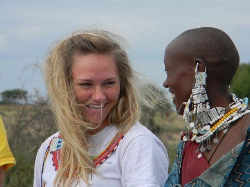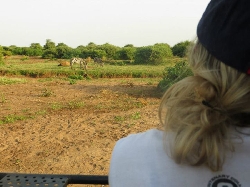Zoology Student Awarded Prestigious Gilman Scholarship for Study Abroad in Tanzania
September 12, 2012

Kelsey Coltrane-Reeb (left), a senior zoology major from Woodstock (IL), was awarded the Benjamin A. Gilman International Scholarship (sponsored by the U.S. Dept. of State's Bureau of Educational and Cultural Affairs) for a study abroad program this past summer in Tanzania, Africa.
[Download Print-Quality Image]
MACOMB, IL – Observing baboons in their West African habitat, participating in game drives in the Serengeti National Park and abiding by a 6 p.m.-6 a.m. curfew due to hyena sightings were all in a summer's work for Western Illinois University student Kelsey Coltrane-Reeb. The senior zoology major from Woodstock (IL) spent part of her time away from Western this summer learning at a study abroad program camp in Tanzania, Africa. She got there because she was awarded the Benjamin A. Gilman International Scholarship (after a rigorous application process)—and because of the support she received from the WIU Office of Study Abroad.
According to Ehren Kuzekov, study abroad adviser in the WIU Office of Study Abroad, the Gilman Scholarship is an "extremely competitive and prestigious scholarship." For this past summer term, the program received more than 2,600 applications and handed out just over 500 awards. Kuzekov said the Gilman Scholarship is generally awarded to students studying in non-traditional study abroad destinations, which are countries outside of Western Europe, Australia and New Zealand.
In her study abroad experience, Coltrane-Reeb participated in the Wildlife Management Studies and Public Health program through the Massachusetts-based School for Field Studies (SFS). According to its website, SFS is a study abroad organization that "creates transformative study abroad experiences through field-based learning and research. Our educational programs explore the human and ecological dimensions of the complex environmental problems faced by our local partners, contributing to sustainable solutions in the places where we live and work." (see www.fieldstudies.org/about)
For Coltrane-Reeb, the program was a great fit for her future career goals. She hopes to someday work with exotic animals.
"I figured Africa would be the best place to observe these animals. Where else can you see zebras, wildebeests and gazelles roaming together? The study abroad program I was in was based at a camp called 'Moyo Hill.' While there were no animals around us (except for the cattle raised by local people and the occasional hyena that roams around), by traveling to the national parks in the region we were able to see many species in their natural habitats," Coltrane-Reeb said.
Having the opportunity to participate in the SFS's Wildlife Management Studies and Public Health program required quite a bit of work on Coltrane-Reeb's part, Kuzekov noted.
"Although we're currently not affiliated with the School for Field Studies study abroad provider, we do have an appeal process through which students can participate in programs with which we are not affiliated," she said.
Kuzekov said in order to apply for the Gilman Scholarship, Coltrane-Reeb completed a rigorous appeal process, which involved a personal statement explaining why this program was more relevant to her goals than one of Western's affiliated study abroad programs.
"Completing this type of appeal takes a lot of time and effort on behalf of the student," Kuzekov explained. "Kelsey then had to complete the application, which requires two essays, a statement of purpose and a follow-on service project essay. I assisted Kelsey in providing her with information regarding the scholarship requirements and essay expectations, reviewed her essays and helped her with her plans for her follow-on service project. The follow-on service project includes giving presentations to students enrolled in FYE [First Year Experience] biology courses this semester, so she can share her experience and, hopefully, encourage new students to think about studying abroad," she added.
For Coltrane-Reeb, who had also participated in a Costa Rica study abroad program while she was still in high school, the benefits of having the opportunity to study abroad are many.
"The knowledge I've gained from the people I've met will stick with me forever. The friends I made there will, hopefully, be with me for the rest of my life," she said. "To me, studying abroad isn't just about the academics or the grade. Being abroad has opened my eyes to a whole new world of how people live their lives. The differences between how we as Americans live our lives and how the local people of Rhotia and Karatu [villages in Tanzania] live, are as different as the hemispheres we live in, and I am so grateful to have been a part of it."
The Benjamin A. Gilman International Scholarship award is sponsored by the Bureau of Educational and Cultural Affairs at the U.S. Dept. of State. The program provides funding to U.S. citizens with demonstrated financial need to assist in covering the cost of studying abroad and is only open to students who are currently receiving the Pell Grant. More information about the Gilman Scholarship is available at www.iie.org/Programs/Gilman-Scholarship-Program/About-the-Program/.
For more information about WIU's study abroad programs, contact Emily Gorlewski, study abroad office assistant director, at (309) 298-2504 or via email at EJ-Gorlewski@wiu.edu.
Posted By: Teresa Koltzenburg (WIUNews@wiu.edu)
Office of University Communications & Marketing


Connect with us: